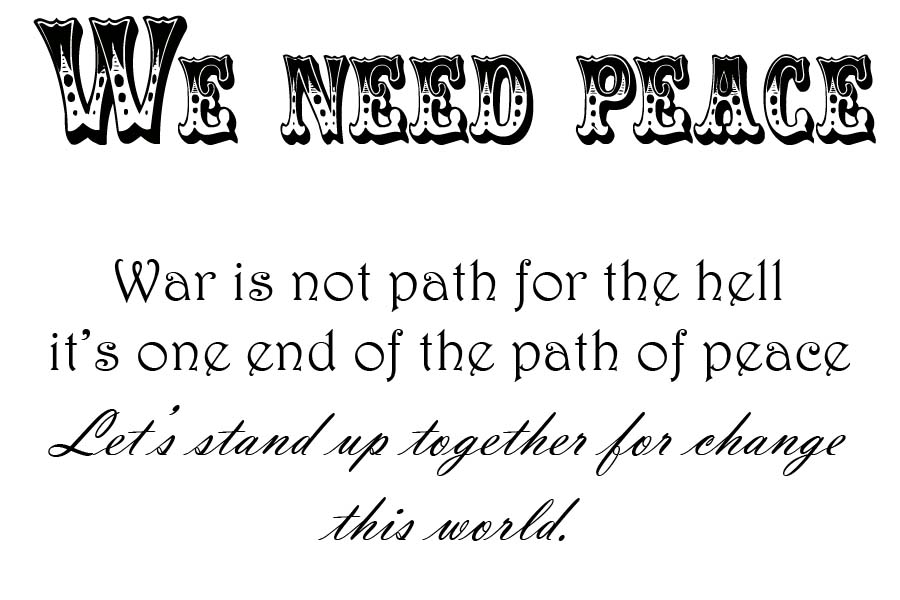The perennial anticipation for peace juxtaposed against the stark and relentless reality of warfare underscores a profound and disquieting phenomenon in human experience. Throughout history, societies have espoused dreams of tranquility, yet there remains a disconcerting frequency of conflict. This essay delves into the Bahá’í teachings that address this paradox, suggesting that beneath the surface, systemic and internal factors inexorably contribute to our proclivity toward war instead of peace.
At the crux of Bahá’í philosophy lies the assertion that humanity is inextricably linked; the well-being of one is irrevocably tied to the well-being of all. This worldview emphasizes unity as a foundational pillar for lasting peace. However, an examination of historical and contemporary conflict reveals that the fragmentation of human society—propagated by prejudices, nationalism, and sectarianism—consistently undermines this principle of unity. When individuals prioritize their affiliations over universal brotherhood, a fertile ground for discord, animosity, and violence is cultivated.
The first consideration in unraveling the expectation of peace is the notion of “psychological schism.” Bahá’í teachings highlight the profound impact of fear and mistrust on human interactions. In times of uncertainty, individuals often retreat into protective postures that exacerbate societal divisions. Fear can breed hostility, as societies redouble their efforts to guard against perceived threats. Consequently, the inherent human fascination with power dynamics within conflict ensues, leading to a counterintuitive expectation that security can only derive from domination rather than collaboration.
Furthermore, the Bahá’í perspective posits that war often arises from misguided assertions of righteousness. History exemplifies this with the myriad of conflicts waged under the auspices of ideological supremacy or religious orthodoxy. In many instances, groups assert their belief systems as the ultimate truth, dismissing others and thereby justifying aggression. This phenomenon not only perpetuates division but also leads to a tragic irony: the very tenets that purport to espouse peace are wielded as weapons in the name of violence.
One cannot overlook the role of economic disparities in exacerbating tensions and fostering environments conducive to conflict. The Bahá’í teachings underscore the necessity of equitable distribution of wealth and resources. In a world where inequity reigns, resentment festers. The incongruity between affluence and poverty not only incites frustration but also breeds hostility; disenfranchised populations may resort to militant forms of expression when their grievances are disregarded. Wars, therefore, often erupt as manifestations of deeper socioeconomic inequalities that go unaddressed and unresolved.
Moreover, the phenomenon of “historical amnesia” plays a critical role in shaping our understanding of conflict. Throughout history, collective memory often embellishes narratives to align with current ideologies, conveniently omitting the complexity and nuances of past events. In the Bahá’í view, recognizing the continuum of human experience, including past grievances and their repercussions, is essential for fostering dialogue and reconciliation. When societies become selective in remembering their histories, they remain ensnared in cycles of vengeance, failing to learn from previous mistakes. Thus, the expectation of peace becomes increasingly tenuous.
The influence of global power dynamics cannot be overstated in this discourse. Nations often pursue hegemonic ambitions, leading to interventionist policies that prioritize national interests over global stability. The Bahá’í perspective advocates for a shift toward global governance and collective security; however, the entrenched interests of powerful nations frequently curtail these aspirations. The dichotomy between the ideal of a unified global community and the practice of self-serving diplomacy perpetuates conflict, fostering disillusionment among those who ardently desire peace.
On a more abstract level, the Bahá’í teachings posit that individual character transformation is a prerequisite for societal change. The rupture between expectation and reality can often be attributed to a lack of moral fortitude and ethical integrity. If individuals do not cultivate virtues such as compassion, empathy, and understanding, the collective aspiration for peace remains shallow and superficial. It necessitates a concerted effort toward personal growth and spiritual development, thereby challenging the deeply entrenched narratives that valorize aggression over harmony.
In conclusion, the paradox of expecting peace while confronting the scourge of war can be contextualized through the lens of Bahá’í teachings. Fundamentally, the sanctity of human life and the interconnectedness of all humanity provide a framework through which to comprehend the impediments to peace. Factors such as psychological schism, misguided assertions of righteousness, economic disparities, historical amnesia, global power dynamics, and individual moral failures collectively illustrate the multifaceted nature of this dilemma. A true commitment to peace necessitates a holistic transformation—encompassing both societal structures and personal conduct. Only through embracing the principles of unity, equity, and mutual recognition can humanity hope to transcend the cycle of conflict and align itself with the enduring aspiration for peace.
